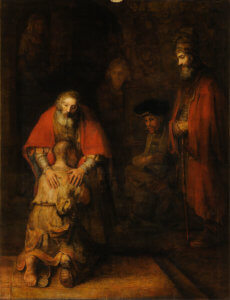The Return of the Prodigal Son by Rembrandt
“You brood of vipers, how can you who are evil say anything good? For the mouth speaks what the heart is full of.” — Matthew 12:34
TEXT: Luke 15:20-32
The elder brother is…(1. Angry 2. Argumentative 3. Absent)
1. Angry (v. 25-29)
“Now his older son was in the field, and as he came and drew near to the house, he heard music and dancing. 26 And he called one of the servants and asked what these things meant. 27 And he said to him, ‘Your brother has come, and your father has killed the fattened calf, because he has received him back safe and sound.’ 28 But he was angry and refused to go in.”
2. Argumentative (v. 29-30)
“His father came out and entreated him, but he answered his father, ‘Look, these many years I have served you, and I never disobeyed your command, yet you never gave me a young goat, that I might celebrate with my friends. 30 But when this son of yours came, who has devoured your property with prostitutes, you killed the fattened calf for him!”
3. Absent (v. 31)
“And he said to him, ‘Son, you are always with me, and all that is mine is yours. 32 It was fitting to celebrate and be glad, for this your brother was dead, and is alive; he was lost, and is found.’”
“There is…one striking difference between the third parable and the first two. In the first two someone goes out and searches diligently for that which is lost. The searchers let nothing distract them or stand in their way. By the time we get to the third story, and we hear about the plight of the lost son, we are fully prepared to expect that someone will set out to search for him. No one does. It is startling, and Jesus meant it to be so. By placing the three parables so closely together, he is inviting thoughtful listeners to ask, “Well, who should have gone out and searched for the lost son?”…Edmund Clowney recounts the true story of a young man who was a U.S. soldier missing in action during the Vietnam War. When the family could get no word of him through any official channel, the older son flew to Vietnam and, risking his life, searched the jungles and the battlefields for his lost brother. It’s said that despite the danger, he was never hurt, because those on both sides had heard of his dedication and respected his quest. Some of them called him simply, the brother. This is what the elder brother in the parable should have done; this is what a true elder brother would have done. He would have said, “Father, my younger brother has been a fool, and now his life is in ruins. But I will go look for him and bring him home. And if the inheritance is gone–as I expect–I’ll bring him back into the family at my expense…the younger brother’s restoration was free to him, but it came at an enormous cost to the elder brother. The father could not just forgive the younger son, someone had to pay! The father could not reinstate him except at the expense of the elder brother. There was no other way. But Jesus does not put a true elder brother in the story, one who is willing to pay any cost to seek and save that which is lost. It is heartbreaking. The younger son gets a Pharisee for a brother instead.” — Timothy Keller (Prodigal God)
TAKEAWAYS: How can we apply this to our heart?
- Self-righteousness wears many disguises
“…what are some ways we can be self-righteous without knowing it? After all, self-righteousness wears many disguises. The scary thing about self-righteousness is that we usually don’t recognize it in ourselves. We think because of our religious practices that we are okay with God. We think because of how we pray that we are trusting in him, not in ourselves. We think because of how we live that we are doing better than the people around us. Self-righteousness stinks; unfortunately, we are the last to smell it on ourselves.” — Trevin Wax
- Self-righteousness takes many forms
- Self-righteousness keeps us from God
“But when the fullness of time had come, God sent forth his Son, born of woman, born under the law, to redeem those who were under the law, so that we might receive adoption as sons. And because you are sons, God has sent the Spirit of his Son into our hearts, crying, “Abba! Father!” So you are no longer a slave, but a son, and if a son, then an heir through God.” — Galatians 4:4-7
